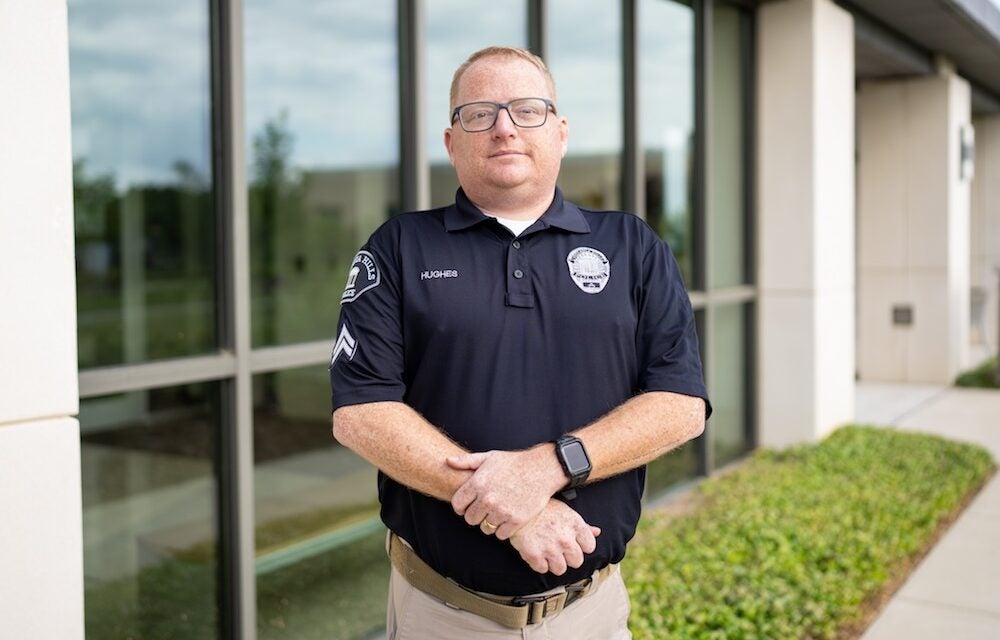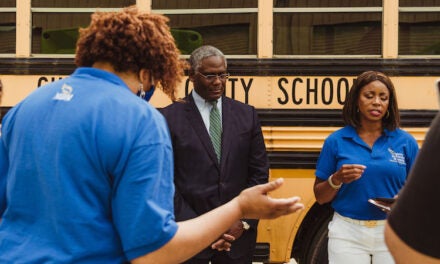By Ashley Tiedt
Photos by Kelsea Schafer & Contributed
Eleven years ago, Corporal Jerry Hughes’s wife Tiffany Hughes decided it was time for a career change.
“This is how far the Lord went back—He knew that I was going to need a nurse at home, and he laid it on her heart to become a nurse,” Cpl. Hughes says.
Tiffany currently works as a nurse at St. Vincent’s Hospital.
Tiffany’s career change sparked a thought in Cpl. Hughes’s mind, but he never followed through, until a lunch meeting with a friend.
“I rarely get to have lunch with this friend, which was another way the Lord worked in this situation,” Cpl. Hughes says. “He got a phone call while we were eating. The caller asked if he knew anyone interested in a job with the Vestavia Hills Police Department. I didn’t know it then, but that phone call saved my life.”
Cpl. Hughes decided to apply for the job in Vestavia Hills. As a part of that process, the department required each of its officers to undergo a physical, which was not a requirement at Cpl. Hughes’s previous department. Roughly a week after the physical, he received a phone call from the doctor.
“The doctor said that my GFR number was at 12-percent, and a normal GFR is 60-percent,” he says.
The National Kidney Foundation defines GFR (Glomerular Filtration Rate) as “a kidney’s ability to filter blood by removing waste and extra water to make urine.” The GFR percentage shows how well the kidneys are filtering.
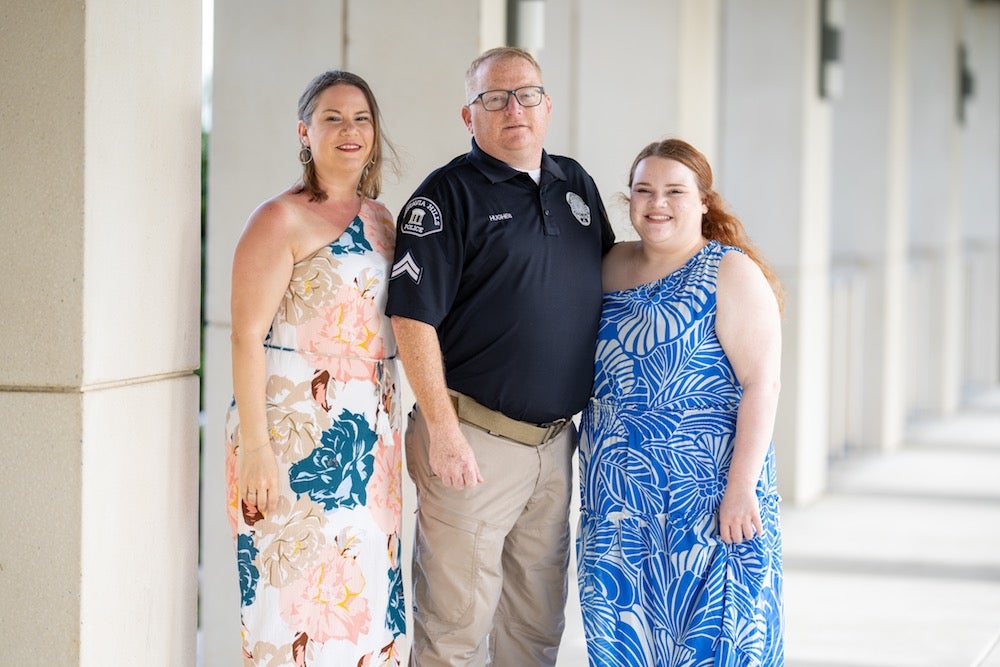
“This is not a death sentence.”
Cpl. Hughes immediately began treatment for kidney failure. He met with Dr. Azita Takeshian at the University of Alabama at Birmingham hospital.
“She walked in and said, ‘Well, you pass the eyeball test, but your numbers are a train wreck.’ She’s very blunt but spent two hours with us explaining everything,” Cpl. Hughes says.
During the appointment, Dr. Takeshian discussed dialysis with Cpl. Hughes and Tiffany.
“She explained everything it entailed, and Jerry was worried about being unable to work,” Tiffany says. “At that moment, I realized that God was continuing to show us His provision. Because I was a nurse, I could provide dialysis to Jerry in the evening while he slept instead of spending 10 hours a day at the hospital. This allowed him to keep working.”
Tiffany was not Cpl. Hughes’s only blessing when it came to being able to continue to work. The Vestavia Hills Police Department was also committed to keeping him on the force.
“I’ve been a patrol cop my entire career, but my stamina was much lower because of the treatment,” Cpl. Hughes says. “Instead of letting me go, the city moved me into the evidence room, so that I was able to keep my job, my pension and my health insurance.”
Working in the evidence room also allowed Cpl. Hughes the ability to attend doctor’s appointments and rest when he needed to. He and Tiffany quickly learned from these doctor’s appointments that a kidney transplant was their only hope of beating this kidney disease. As they would soon learn, getting on the list was only the beginning of the journey.
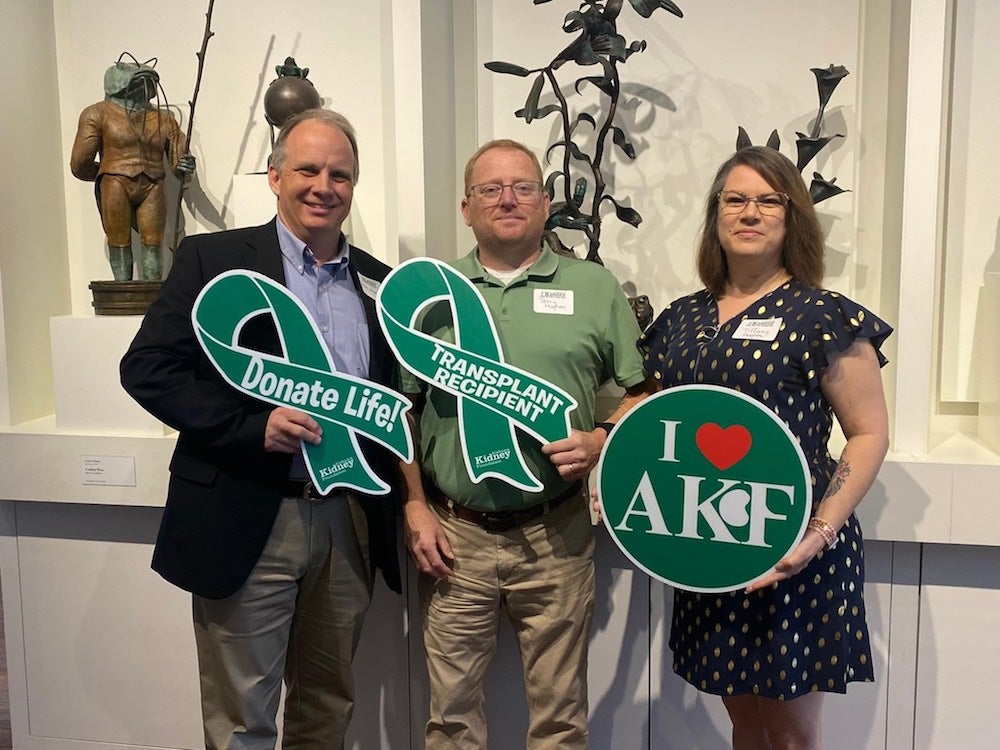
The Journey toward a Kidney Transplant
To be placed on any transplant list, there is a litany of tests that have to be run and milestones reached. In running these tests, doctors discovered that Cpl. Hughes’s heart was not strong enough to allow him to make the list. The first step in this long process would be getting his heart healthy.
There were trips to the ER and talks of potential treatments that if elected, would not allow for Cpl. Hughes to receive a transplant. Thankfully, Dr. Takeshian was there to make sure every measure was taken to avoid any treatment that would prevent him from making it onto the transplant list.
Once Cpl. Hughes made it onto the transplant list, it was time to get a kidney. His daughter Danielle Hughes took recruiting one as a personal challenge. Danielle contacted the media and made a plea on Facebook to find her dad a kidney. Several family members who have Cpl. Hughes’s blood type were tested as a match. To their dismay, one by one it was determined that something prevented them from being his donor.
While all this was happening, God was preparing the heart of Cpl. Hughes’s donor, Lieutenant Mike House, who felt a tug on his heart. Also a law enforcement officer, Lt. House needed to drop weight to get on the list.
It took some time, but after a lot of hard work, Lt. House was finally eligible to donate. Once he made it on the list, his donor coordinator asked what he wanted to do next, to which he replied, “The Lord hasn’t told me that yet.”
Lt. House waited to hear what the Lord had planned for him next. Soon after, he saw a story on Cpl. Hughes and his need for a kidney. At that point, Lt. House called his donor coordinator and told her he was ready for the next steps.
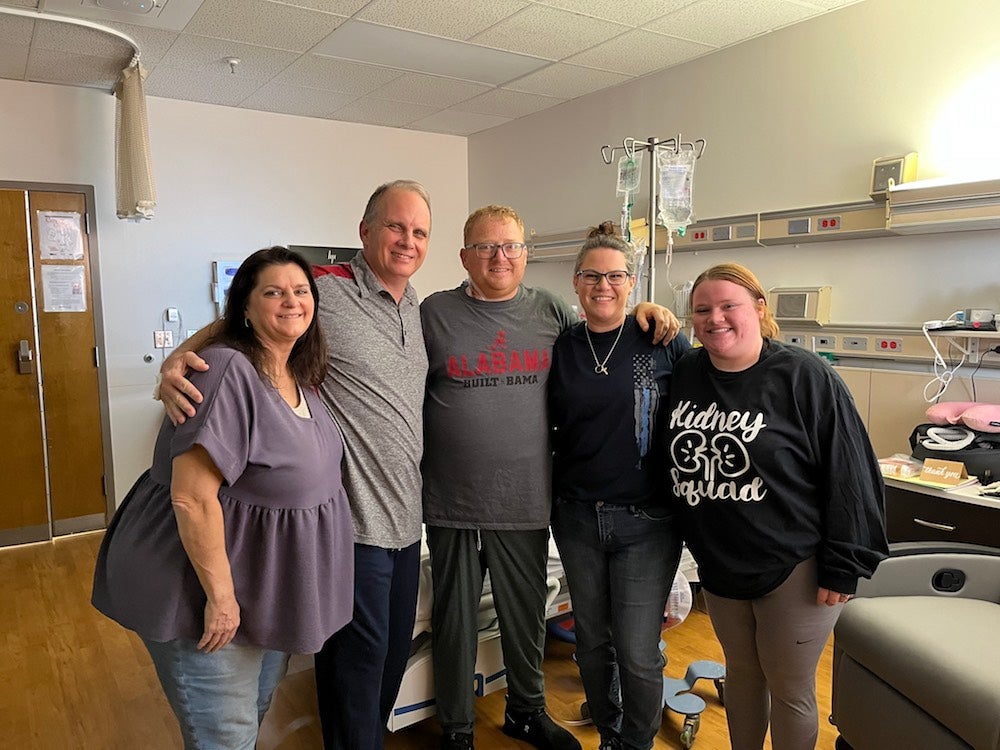
Transplant Day and Beyond
It was an exciting day for the Hughes and the House families. They didn’t know each other that morning, but by the end of the day, they would be family.
Tiffany sat in the hospital waiting room while her husband was being prepped for the surgery. Each time the sliding glass doors opened, she wondered, “That person could be my husband’s donor.”
“Each time the front desk would call out a name, we’d Google them,” Tiffany says. “We knew that the donor was in law enforcement, so we were searching to see where each person worked.”
After giving up, Tiffany and her best friend were approached by Lt. House.
“Mike introduced himself to us, and we were able to meet his family,” Tiffany says. “We were so grateful to Mike and to the opportunity to thank him before the surgery.”
Lt. House and Cpl. Hughes’s wives received near-simultaneous updates about the status of their respective surgeries. Both surgeries were a success, and the two men finally met each other face-to-face on the day of Lt. House’s release.
“I was finally able to tell him how thankful I was for him, and his willingness to give me a new lease on life,” Cpl. Hughes says.
It has been about a year since the kidney transplant, and Cpl. Hughes is looking toward coming off restrictive duty, meaning he can return to patrolling if he chooses. He has also been elected the 2024 chairperson for the National Kidney Foundation Alabama chapter.
The journey toward a new life was long for Cpl. Hughes, but thanks to his brother in blue and the “God winks” that brought them together, he is thriving in this new life and raising awareness about a disease that almost took it.
To learn more about kidney disease visit kidney.org.
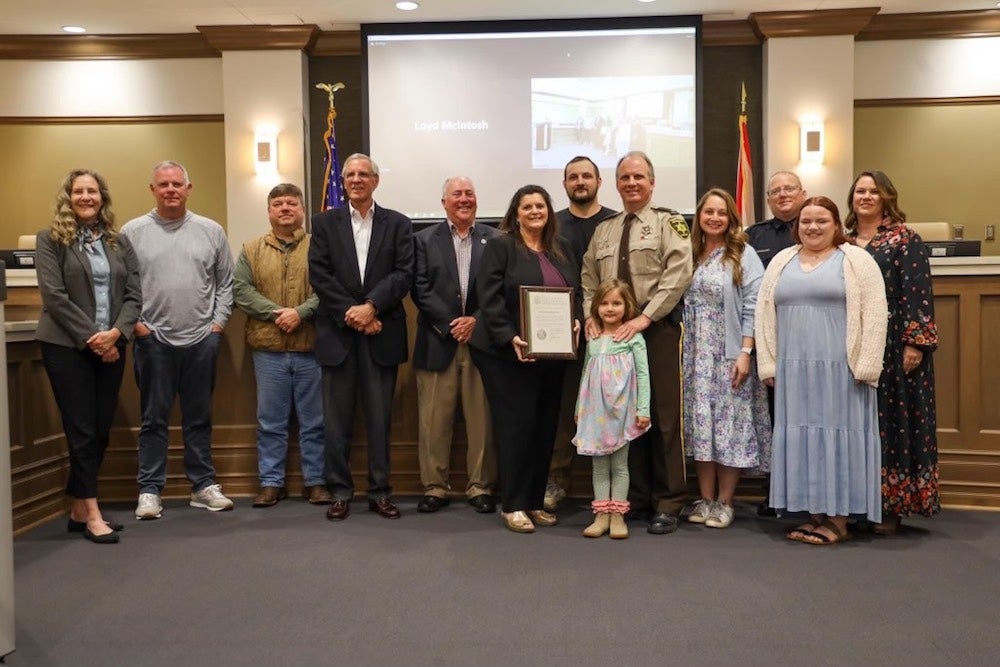
How Do Kidneys Work?
According to kidney.org, the human body has two, adult fist-size kidneys—one on the left and another on the right of the spine below the rib cage. Kidneys are responsible for filtering toxic waste out of the bloodstream. This happens when blood enters the kidneys and is cleansed by the kidney’s blood filters. Next, waste is transported to the bladder. New, clean blood is then returned to the body through one’s veins. The kidneys filter around 200 quarts of fluid every 24 hours.
Signs and Symptoms of Kidney Disease
More than 37 million Americans are living with kidney disease, but many probably do not know it, according to kidney.org. Here are some signs and symptoms of kidney disease to look for:
- Trouble sleeping
- Dry, itchy skin
- Urge to urinate more frequently
- Foamy urine
- Ongoing puffiness around the eyes
- Swollen ankles and feet
- Consistent muscle cramps
Additionally, those with high blood pressure, diabetes, family history of kidney disease and those who are 60 years old or older are more likely to develop kidney disease. Ask your doctor if you may be at risk and how often you should get tested. Early diagnoses save lives.

